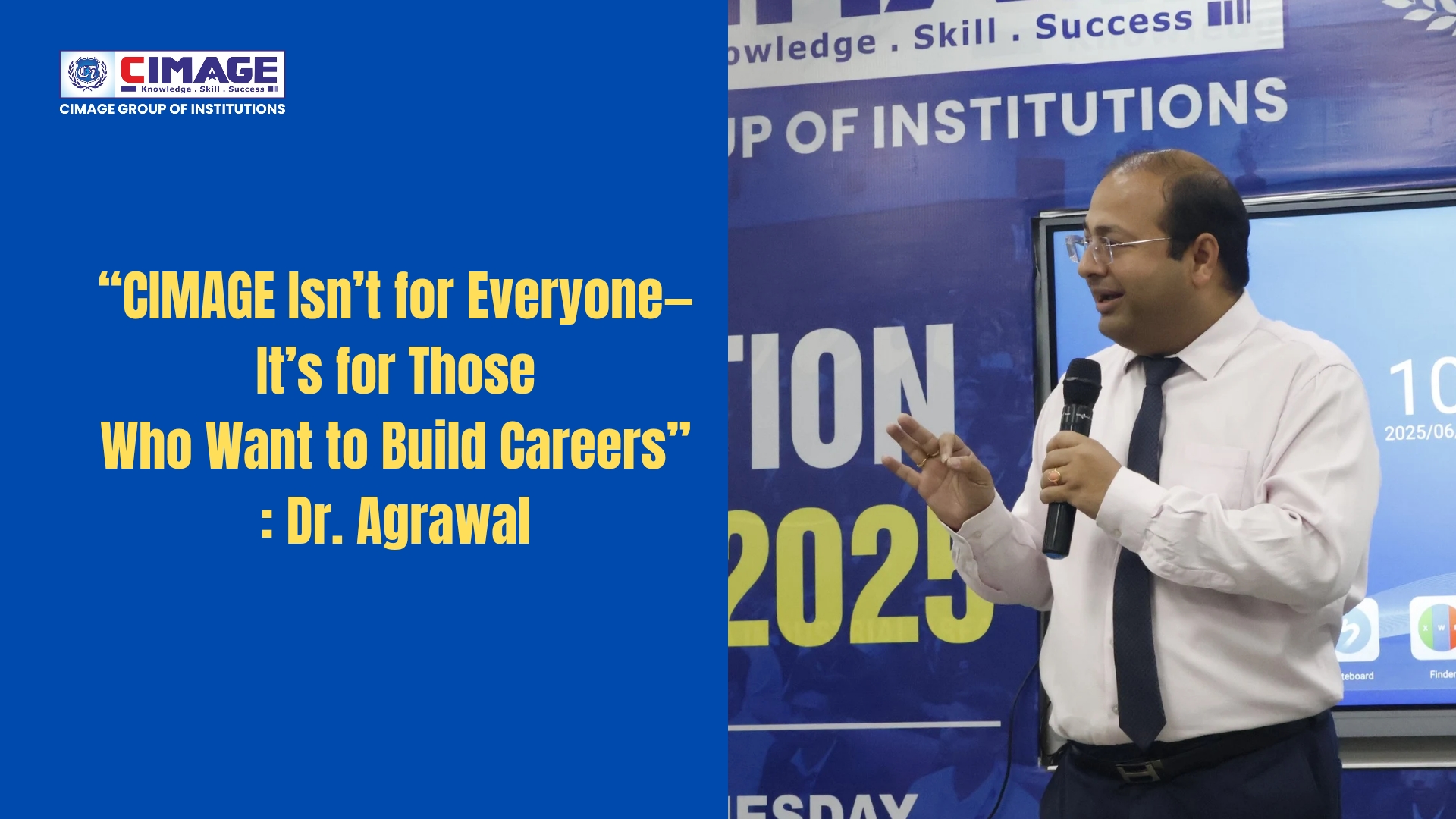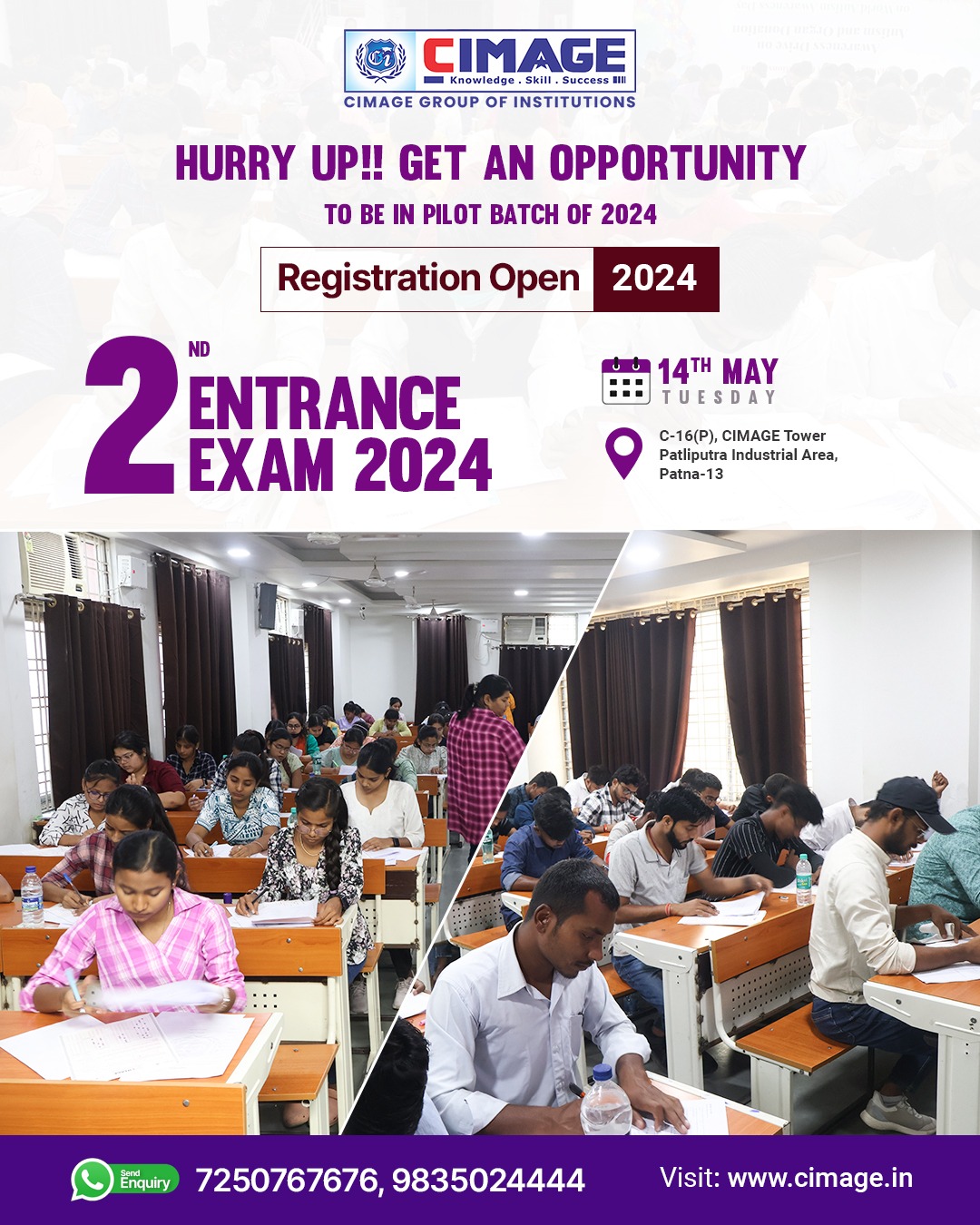
CIMAGE Isn’t for Everyone—It’s for Those Who Want to Build Careers: Dr. Agrawal
In an era where education often becomes a race to clear exams, Dr. Neeraj Agrawal, Director of CIMAGE College, Patna, delivered a powerful and thought-provoking address to aspirants on the day of the institution’s fourth entrance exam. His speech wasn’t just a welcome note—it was a call to action, a reality check, and a roadmap for success in the 21st-century workforce.
Beyond the Exam: The Problem with Traditional Learning
Dr. Agrawal began by addressing a fundamental flaw in how students approach education. "You were not studying for knowledge,” he said frankly. “You were studying just to pass exams.” He pointed out that most students selectively study topics they know will be on the test. ‘Chapters’ that aren’t likely to appear in exams are often ignored, leading to gaps in understanding.
This approach, he noted, creates a cycle. From high school to competitive exams like the IIT entrance test, the focus remains on passing rather than learning. And after crossing one hurdle, the next exam waits. But life, he emphasized, doesn’t reward those who merely pass tests. It rewards those who develop skills and understanding.
Knowledge vs. Skill: The English Language Example
To drive home his point, Dr. Agrawal used the example of English education in India. Students study the language for 8 to 10 years, yet many lack the confidence to speak it fluently. Why? Because they learn it for written exams, not to acquire the skill of communication. “Writing English is knowledge,” he explained. “Speaking English is a skill. And to succeed, you need both.”
This distinction between knowledge and skill extends to all fields, especially technology. Learning programming or software tools by rote doesn’t make someone a developer. Like swimming or cooking, technical skills require practice and experience, not just theoretical understanding.
Education That Reflects Industry Needs
Dr. Agrawal criticized outdated curriculums that fail to reflect the current industry landscape. “In many institutions, students still study FoxPro and COBOL—technologies that are obsolete in today’s industry.” He argued that while foundational knowledge is necessary (just like learning with a plastic bat before a wooden one in cricket), modern skills must be integrated into education.
At CIMAGE, this philosophy is central. Students study both traditional subjects and cutting-edge technologies like Artificial Intelligence, generative AI, blockchain, cloud computing, AWS, GitHub, MongoDB, Django, and the Internet of Things. These are the “four chapters” that won’t be on an exam but are essential for real-world success.
The college offers over 40 industry-relevant add-on courses. Dr. Agrawal made it clear: “If you're only here to pass exams, this may not be the right place for you. But if you're here to learn, grow, and build a career, then CIMAGE is where you need to be.”
A Culture of Effort and Excellence
Dr. Agrawal was candid about the expectations at CIMAGE. Success here doesn’t come from shortcuts or simply paying fees. It comes from consistent effort. Students must engage deeply, ask questions, try, fail, and try again. “You don’t become a chef by watching cooking shows. You have to cook. Similarly, you don’t become a software engineer by reading textbooks—you have to build.”
He emphasized the importance of class attendance, practice, and discipline. "If a student is expected to help at home or work at a family shop, this may not be the right time or place for college. We’re not just giving degrees here. We’re creating professionals.”
He compared CIMAGE to a military camp in terms of discipline and structure—regimented schedules, assignments, projects, and assessments are all part of the journey. Just like in the army, this structure builds strength, character, and resilience.
No Shortcuts to Success
Addressing a common mindset among some students and families, Dr. Agrawal warned against looking for easy ways out—like paying for attendance or relying on cheating in exams. “There are plenty of places where that’s possible,” he said, “but not at CIMAGE.” Here, internal assessments are strict, and students are expected to pass based on merit alone.
The college mandates unique, individual projects, ensuring that each student contributes meaningfully and gains hands-on experience. “You will not share your project with 10 other friends. Everyone will build something of their own.”
Discipline: The Missing Ingredient
Dr. Agrawal highlighted another crucial issue—lack of discipline among students. “If you had discipline, you would’ve studied regularly, completed homework on time, made notes. But most of you didn’t.” He explained that success in any field, whether it's sports or academics, demands discipline. Greats like Sachin Tendulkar and Virat Kohli weren’t just talented—they were disciplined and dedicated.
He believes that discipline, once instilled, can transform even average students into industry leaders. And at CIMAGE, the environment is designed to foster that discipline through a balance of rigor and support.
Commitment From All Sides
Dr. Agrawal also addressed guardians, emphasizing their role in a student’s academic journey. “You must also ensure that your child attends class, does assignments, and remains engaged. Their habits from school may not have prepared them for this level of rigor, but together we can change that.”
He invited everyone to visit the new CIMAGE campus to witness the infrastructure and environment that supports collaborative, technology-driven learning. It’s a place where students not only attend classes but also learn from peers, mentors, and hands-on experiences.
Come Prepared to Work
In his closing remarks, Dr. Agrawal made one thing very clear: "Come to CIMAGE only if you're ready for the grind. There’s no easy path here, but the rewards are immense. We don’t offer comfort—we offer transformation.”
His speech, though direct and at times challenging, was filled with a genuine desire to see students succeed—not just in exams, but in life. In an education landscape often focused on shortcuts, Dr. Neeraj Agrawal’s message stands out as a powerful reminder that real success comes from hard work, skill-building, and an unrelenting commitment to growth.













